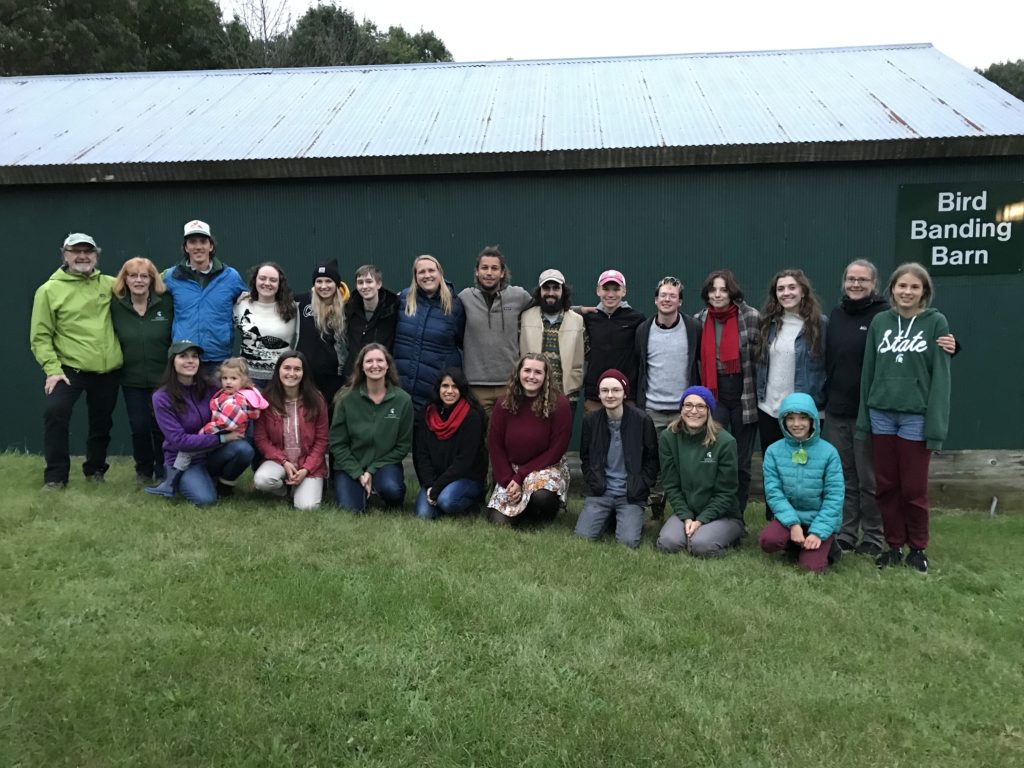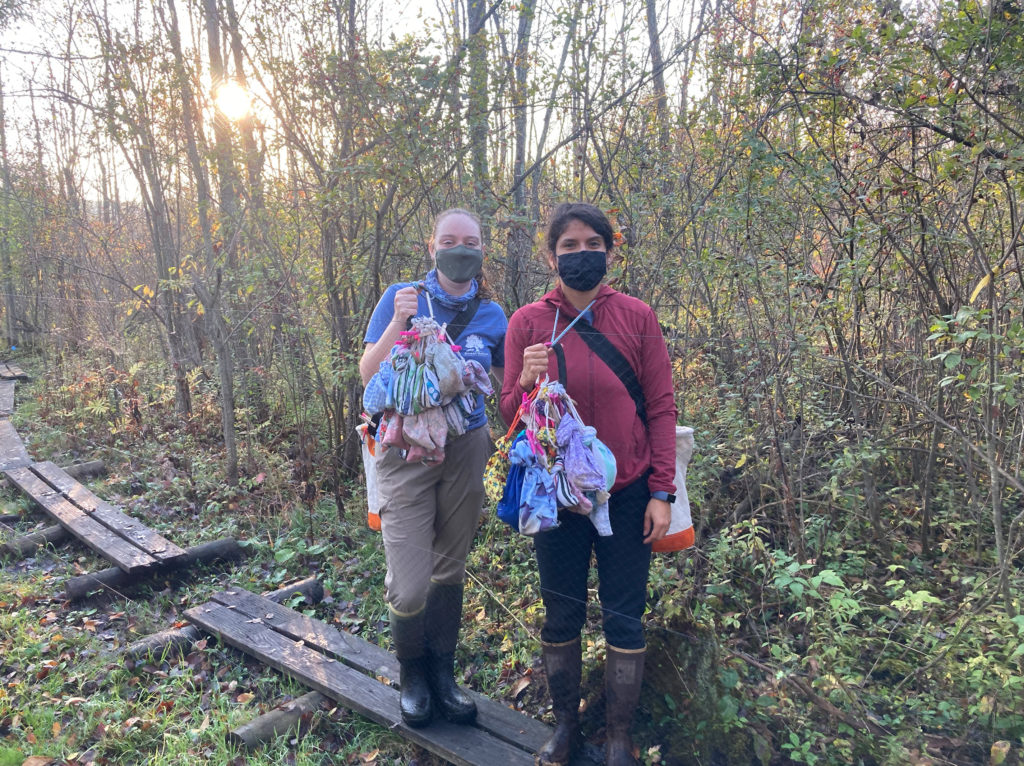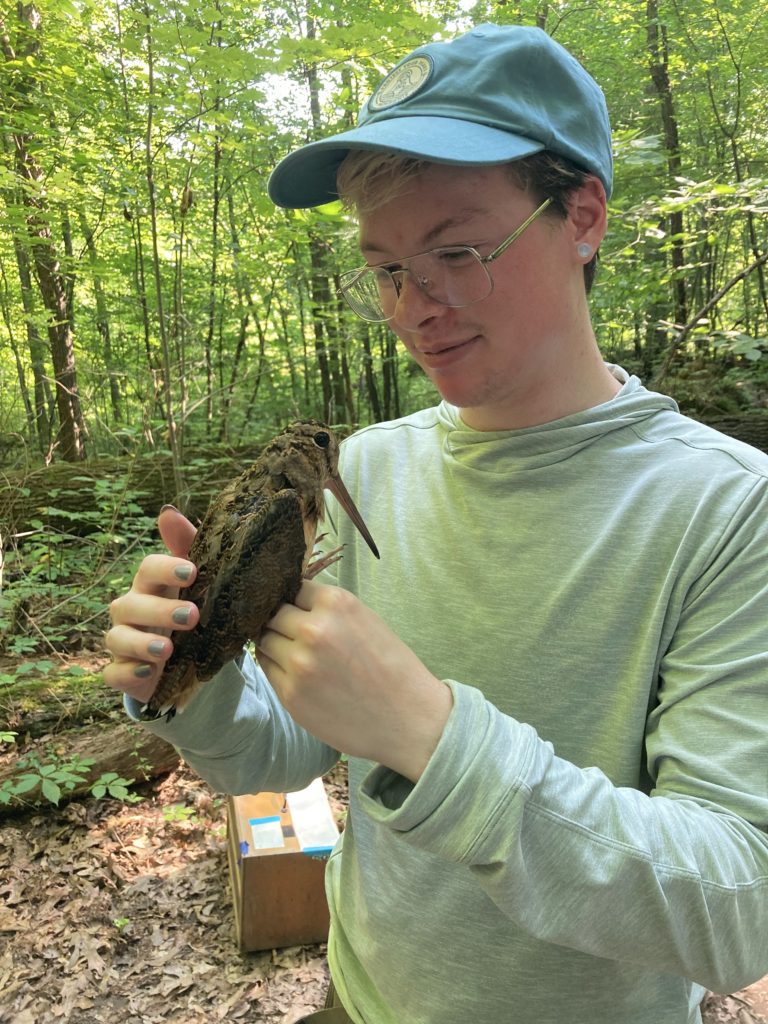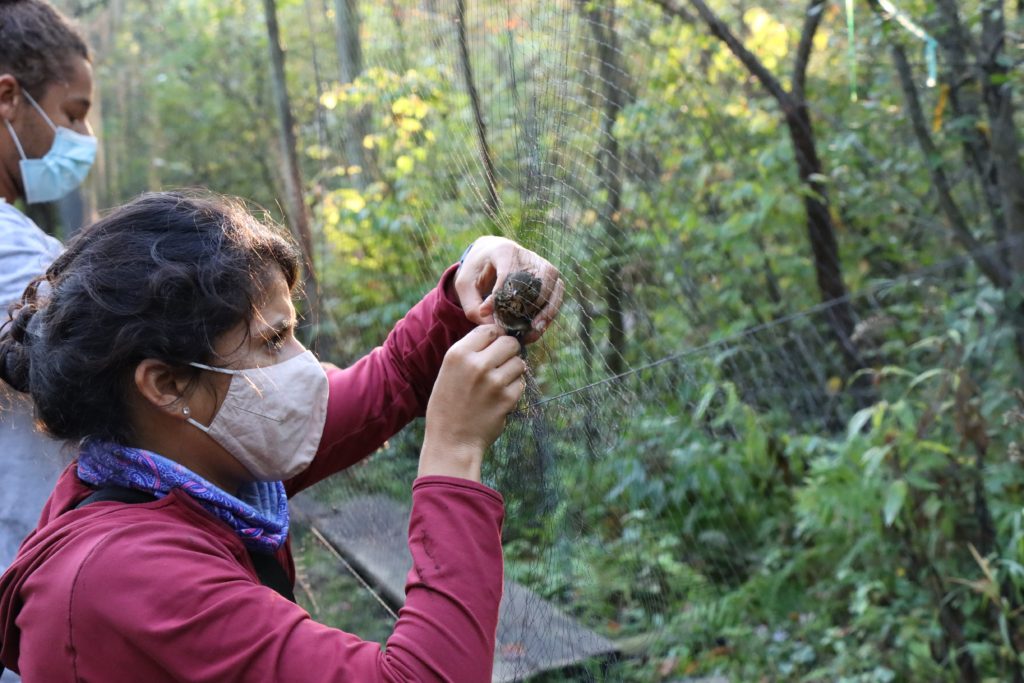Instructions for applying to work on a seasonal field crew
We offer many different opportunities during the spring and fall banding seasons! We begin hiring for the spring season (if there is one) in March and for the fall season in May/June. We have the following positions available.
- Student (MSU and non-MSU) internships (field and off-season)
- Paid seasonal field crew positions (bird bander, experienced mist-net technicians)
- Community volunteers
When hiring, all paid positions for non-MSU students are posted on the MSU HR website, and on Texas A&M’s Department of Wildlife and Fisheries Sciences Job Board website.

Paid Experienced Seasonal Field Positions
Each season (spring and fall) we will be hiring full-time seasonal positions for bird bander and experienced mist-net technicians. We will post these on the MSU HR website, and on Texas A&M’s Department of Wildlife and Fisheries Sciences Job Board website.
Bird Bander Job Description
Applications are closed at this time.
Experienced passerine bird bander needed from 13 Aug to 20 Oct to work with a large crew at two high-volume bird banding stations during fall migration research. Michigan State Bird Observatory (MSBO) operates two banding stations – the Burke Lake Banding Station and the Corey Marsh Banding Station (CMBS), which are both located in or near Bath, Michigan (near East Lansing, Michigan). The stations collectively capture over 6,000 birds per fall field season of 85 – 88 species. Daily captures can exceed 200 birds.
Each station opens nets 30 minutes prior to sunrise and close nets 5 – 5.5 hours post-sunrise (banding may continue later in morning). BULA has 28 mist-nets and is open 7 days a week, weather permitting, and CMBS has 15 mist-nets and is open 3 days per week. Education and outreach are a key part of our mission; hence, the stations are open to the public and will host educational programs.
To maintain consistent data collection there is only one bander at each station per morning. The bander is responsible for efficiently and safely handling all new and recaptured birds. They must have excellent species identification skills – particularly eastern landbirds which include many ‘confusing fall warblers’. The bander must be able to age birds using skull and molt limits. The bander will be responsible for assessing condition – through scoring of fat stores and muscle, taking morphological measurements, and examining bird for ectoparasites (i.e., ticks). When not banding, the individual will assist with extracting birds from mist-nets and training interns in extraction (using body-first method). The bander will work closely each day with 2 volunteer or intern data recorders and must communicate clearly and effectively to maintain accuracy of data collection. Additionally, the bander will need to be a willing and effective communicator with visitors and share the banding process and answer questions. Other responsibilities include assisting with the upkeep and maintenance of the study site (i.e., net and boardwalk repair), assisting with social media posts, and doing data entry. The bander is responsible for getting up 1 – 1.5 hours earlier than net-opening to check weather and make a call on whether there will be a delay in opening nets and communicate with the entire crew via text.
We are looking for at least one individual that will stay for 1 week after we close down station (October 15th) to assist with taking down banding stations, cleaning and organizing equipment, proofing and summarizing data.
Banders will be part of a crew that each morning include 1 bander, 2 – 3 mist-net assistants, 1 – 2 student interns, 1 outreach specialist, and 1 – 2 volunteer data recorders.
The individual will need to be successfully sub-permitted under Dr. Jen Owen’s Master Banding Permit.
A reliable personal vehicle, valid driver’s license, and auto insurance are required. Hiring is contingent upon passing a background check and drug screen through Michigan State University.
There are tent-camping (“glamping”) accommodations available at the Corey Marsh Ecological Research Center – including, full bathroom, small indoor and outdoor kitchenettes, and a structure over the tents (provided). These are free accommodations with the expectation of contributing to upkeep and cleaning of the spaces used by the crew.
Desired Qualifications:
They must have excellent species identification skills – particularly eastern landbirds which include many “confusing fall warblers”. The bander must be able to age birds using skull and molt limits. The bander will be responsible for assessing condition – through scoring of fat stores and muscle, taking morphological measurements, and examining bird for ectoparasites (i.e., ticks). Additionally, the bander will need to be a willing and effective communicator with visitors and share the banding process and answer questions.
Experienced Mist-net Technician Job description
Applications are closed at this time.
All non-MSU students and staff will apply for positions through MSU HR. Please apply through the link above. If you are currently a student or employee at MSU please send email to Dr. Rose Stewart (stewa684@msu.edu) or Dr. Jen Owen (owenj@msu.edu) to inquire about hiring process.
Description: Experienced mist net assistant needed from 13 Aug to 17 Oct to work with a large crew at two high-volume bird banding stations during fall migration research. Michigan State Bird Observatory (MSBO) operates two banding stations – the Burke Lake Banding Station and the Corey Marsh Banding Station (CMBS), which are both located in or near Bath, Michigan (near East Lansing, Michigan). The stations collectively capture over 6,000 birds per fall field season of 85 – 88 species.
Each station opens nets 30 minutes prior to sunrise and close nets 5 – 5.5 hours post-sunrise (banding may continue later in morning). BULA has 28 mist-nets and is open 7 days a week, weather permitting, and CMBS has 15 mist-nets and is open 3 days per week. Education and outreach are a key part of our mission; hence, the stations are open to the public and will host educational programs.
Mist-net assistants are responsible for the efficient and safe extraction (using body-first technique) of birds from mist-nets at 30 – 45-minute net runs. Additionally, they will be responsible for training interns in mist-net extraction and communicating with visitors about the purpose of our research, importance of bird banding, and biology and ecology of migratory landbirds. Other responsibilities include data recording in the field, greeting and talking with visitors, repairing nets, assisting with social media posts, and maintaining a clean and safe banding station.
Mist-net technicians will be part of a crew that each morning include 1 bander, 2 – 3 mist-net assistants, 1 – 2 student interns, 1 outreach specialist, and 1 – 2 volunteer data recorders.
A reliable personal vehicle, valid driver’s license, and auto insurance are required. Hiring is contingent upon passing a background check and drug screen through Michigan State University.
We are looking for at least one individual qualified to train interns and assist with overseeing daily operations.
There are tent-camping (“glamping”) accommodations available at the Corey Marsh Ecological Research Center – including, full bathroom, small indoor and outdoor kitchenettes, and a structure over the tents (provided). These are free accommodations with expectation of contributing to upkeep and cleaning of the spaces used by the crew.
Desired Qualifications: We are looking for individuals that have experience working at high-volume banding stations with a record of safe extraction and handling of birds. Additional experience training interns in mist-net extraction is desired. We are looking for enthusiastic individuals who are reliable and adaptable to a wide range of conditions, including temperature extremes, mosquitoes, and poisonous plants. Other desired qualifications are individuals that are willing to jump in and help when they see it is needed, interested and willing to engage with the public, and are detail-oriented, organized, and professional.
Please see the Student Internships (MSU and non-MSU students)
Internships are available each fall banding season (August – October). Mist Net Interns will be trained to check nets and extract birds, under the supervision of MSBO-trained field staff. They will learn bird handling techniques, how to set up, open and close mist nets, public outreach, and data entry. Fall Mist Net Interns are needed from 15 August to 15 October.
MSU Students
MSBO Student Employee (Intern) Position Description and Application Instructions
Dates: August 13 – October 17, 2024
Applications for the Fall 2024 are closed.
Overall description: Seeking student interns who are interested and excited to learn how to handle and extract migratory landbirds from mist-nets with a large field crew at two high-volume bird banding stations during fall migration. Michigan State Bird Observatory (MSBO) operates two banding stations: the Burke Lake Banding Station (BULA) and the Corey Marsh Banding Station (CMBS), which are located in or near Bath, Michigan (~ 20 minutes from campus). The stations collectively capture over 6,000 birds of 85-88 species during the fall banding season. Each station opens nets 30 minutes prior to sunrise and closes nets 5 – 5.5 hours post-sunrise (banding may continue later into the morning). BULA has 28 mist-nets and is open 7 days a week and CMBS has 15 mist-nets and is open 3 days per week (weather permitting). Education and outreach are a key part of our mission; hence, the stations are open to the public and host educational programs. Student interns will be responsible for learning how to handle and extract migratory landbirds from mist-nets with the expectation that interns will be able to work independently by the end of the field season. Additional responsibilities will include assisting with data recording in the field.
Qualifications: Reliable and willing to work early mornings, enthusiastic, desire to learn, attention to detail, ability to work with a big crew, dedicated to science integrity, and willingness to engage with the public.
Level of commitment required: Students must be able to work 3 full days (weekdays and/or weekends from 30 minutes before sunrise to at least 1pm) throughout the field season (starting 13 August) and ideally willing and able to work more days prior to start of classes.
Application instructions:
Please prepare letter of interest, resume, and contact information for 2 – 3 references that have knowledge of your work experience. Your letter of interest must include the following:
Section 1: Please detail your interest by addressing these questions: Why are you interested? What excites you about the position? What are you hoping to learn from the experience? How will this experience help you further your advancement in your career, particularly what is unique about this experience relative to other similar opportunities?
Section 2: Please indicate your availability for the fall. What days of the week are you available to work from at least 30 minutes prior to sunrise until 1pm (many days we will end earlier but there are days that can extend beyond 12noon). When can you start (preference will be given to individuals that can start at beginning of field season and are available at least 3 days per week)?
Section 3: Any other info that you think is helpful to know and relevant to position. For example, other volunteer or paid positions you have had that relate to this experience.
Submit application materials via e-mail to Dr. Jen Owen (owenj@msu.edu) and Dr. Rose Stewart (stewa684@msu.edu) by March 8, 2024. Please use “MSBO Student Application – Last Name” as the subject header of your e-mail. A single PDF document with all materials is preferred.
Volunteers
**Change in process for becoming a MSBO volunteer.
Volunteers help us in many ways year-round. However, there can be limited spots and we cannot always accommodate everyone that would like to volunteer in a particular season.
Please note that we do not offer volunteer positions for mist-net extraction or banding. If you want to work as a mist-net extractor, then you would need to go through the hiring process to be an official and paid member of the crew.
Volunteering at the banding stations
If you are interested in being a volunteer at one of our bird banding stations, we have specific volunteer positions that each have different eligibility criteria. Please visit one of our stations and observe for a morning before signing up to volunteer so you are aware of the sites, what we do, the proper attire and to make sure the work is something you would enjoy! Volunteers must be adults. We offer two different volunteer positions:
- DATA RECORDER: Individuals that are willing to sit for longer periods of time and can focus on the task despite a lot of distractions. Attention to detail and willingness to ask questions is critical. Each station has 2 data recorders – one person entering data via app on iPad and another person recording data using paper datasheets. A volunteer can indicate if they are comfortable with one or the other or both. Requirements for being dedicated volunteer data recorder:
- Individual must take one of our trainings prior to volunteering. These are typically scheduled one week prior to start of field season and then mid-September.
- Available to work 2 – 3 mornings per week for the field season and stay for the entire morning (5 hours) or a minimum of three hours.
- Willing to adhere to the protocols for recording data.
- GREETER: Individuals volunteering in this role will be responsible for greeting visitors arriving at the station – especially when the crew are on net runs. They need to make visitors feel welcome and help to answer their questions. Additionally, the greeter will help to make sure all visitors sign the guestbook before they leave and also help with any sales of swag items.
- Requirements for this position include:
- Comfortable interacting with people of all ages
- Willing to talk with visitors and answer questions
- Able to work a minimum of 1 morning per week over the field season.
Please fill out this form if you are interested in volunteering so that we can match our needs with your interests and availability. We need volunteers to help with data recording, outreach events, sewing bird bags, construction projects, site maintenance and much more.
Volunteers must be adults and complete a background check prior to volunteering at the banding stations or during programs. Please email burkelakebanding@gmail.com for more information.
For more information on volunteering with the MSBO, email burkelakebanding@gmail.com.



MSU Undergraduate Research and Independent Study
MSU Undergraduate research and independent study opportunities are available to current MSU Undergraduates. Research can serve as the 3 credits needed of FW 490 experiential learning/independent study. Interested? Please contact Dr. Jen Owen directly to seek more information – owenj@msu.edu
Non-field research opportunities include fecal sample analysis, capture and recapture data analysis, and bench work including tick ID and microscopy.
MSU is an affirmative-action, equal-opportunity employer. Notice of Nondiscrimination



